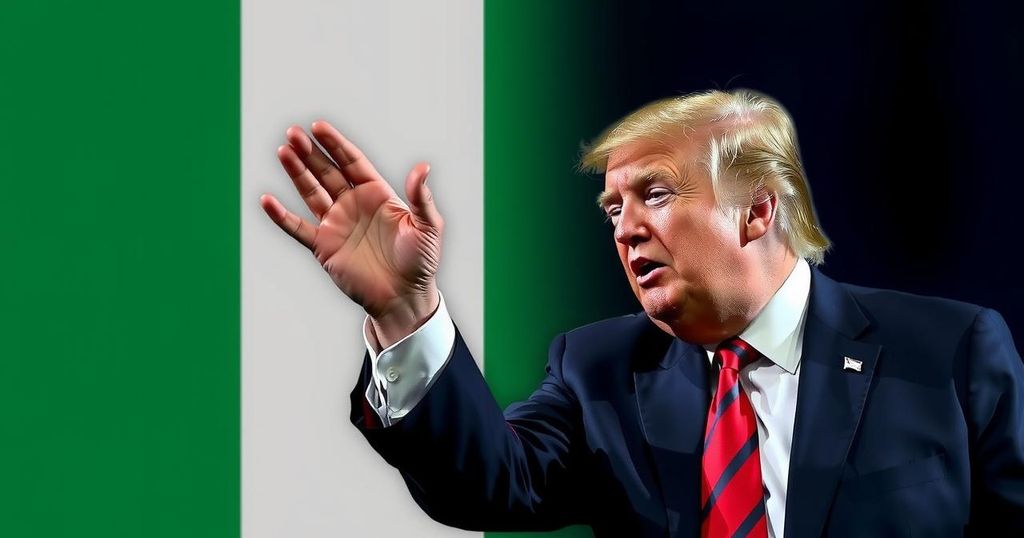The Implications of Donald Trump’s Reelection for Nigeria and Africa

Donald Trump’s second term presents potential challenges and opportunities for Nigeria, emphasizing self-reliance in funding and security. His anticipated policies may impose strict immigration measures, affecting undocumented Africans in the US. Additionally, trade dynamics could shift in favor of American interests, leaving Nigeria and other developing nations at a disadvantage. The implications of these policies warrant close monitoring from African leaders and international analysts alike.
Donald Trump has secured a historic second term as President of the United States, triumphing over Democratic candidate Kamala Harris. In his remarks following the election, he emphasized the extraordinary mandate given to him by the American populace, declaring, “This will truly be the golden age of America.” As he returns to the White House, significant shifts in US foreign policy are anticipated, especially in light of global instability. During his campaign, Trump championed non-interventionist policies and trade protectionism under the slogan “America First.” Analysts suggest that this approach could signal a move for foreign nations, including Nigeria, to independently manage their funding and security needs. While Africa has frequently been overlooked in US political discourse, the outcome of this election resonates widely across the continent, including expressions of support from various African leaders, including President Bola Tinubu of Nigeria, who expressed hope for enhanced relations between Nigeria and the United States. Trump’s previous term was marked by limited engagement with Africa, leaving many to speculate about his commitment to the continent. Notably, during his earlier presidency, he refrained from visiting Africa and reportedly made disparaging remarks about certain African nations. Yet, some analysts opine that his second term could afford opportunities to address pressing issues in Africa, spanning trade, health, and security. In light of Trump’s victory, stringent immigration policies are expected, reminiscent of his initial term. Professor Toba Alabi from the Nigerian Defence Academy notes that Trump’s policies prioritize American interests and compel Africans to focus on local development instead of seeking opportunities in the United States. As such, illegal migrants from Nigeria and other African nations may face heightened concerns under the anticipated immigration protocols. Furthermore, Trump’s stance on global economic dynamics affirms a competitive approach rooted in western interests that may not favor developing countries like Nigeria. According to Professor Alabi, Nigeria could face a skewed trading environment where local production is devalued amidst expanded US energy output and potential tariffs on foreign imports. Although LGBTQ rights were not a focal point of Trump’s campaign, his past comments signal a continuation of conservative policies that contradict progressive movements in Nigeria. His previous declarations, including a call to end gender-affirming programs, could further cement a divide over human rights issues between the US and its African partners.
The implications of Donald Trump’s recent electoral victory for Nigeria and broader African geopolitics have sparked considerable debate. His administration is expected to advance a policy of non-interventionism and trade protectionism, potentially affecting international relations and domestic policies across African nations. Policymakers and analysts are closely monitoring how his presidency will influence economic partnerships, immigration policies, and human rights agendas in Africa, especially given the historical context of US-African relations.
In conclusion, Donald Trump’s election victory portends significant changes for Nigeria and Africa at large. His policies may foster an environment where African nations must take greater responsibility for their development, security, and diplomatic engagements. The anticipated return to strict immigration policies and trade practices underscores the ongoing complexities of US-African relations. As African leaders, including Nigeria’s President Tinubu, anticipate opportunities for cooperation, the outcomes will largely depend on how effectively both parties navigate the political landscape formed by Trump’s administration.
Original Source: www.bbc.com








